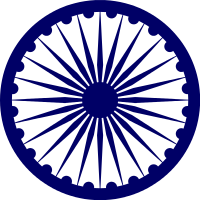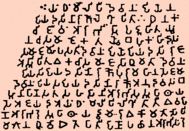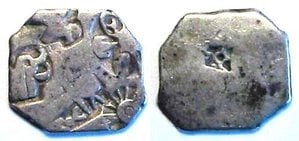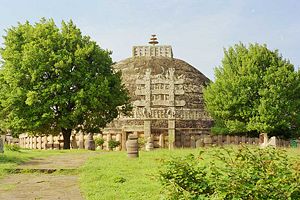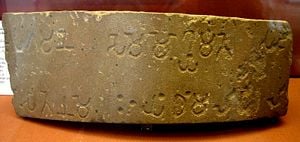LESSON 11
Press Information Bureau
(Chief Minister Information Campus)
Information and Public Relations Department, U.P.
Important cabinet decisions
Lucknow : February 26, 2009
Following decisions were taken at a cabinet meeting presided over by the
Uttar Pradesh Chief Minister Ms. Mayawati, here today:—
Project Pro-forma of U.P. Bhoomi Sudhar Nigam’s U.P. Sodic Land
Reclamation Project-III financed by World Bank approved in principle
The Cabinet has approved in principle project pro-forma the U.P. Sodic
Land Reclamation Project-III being implemented by U.P. Bhoomi Sudhar
Nigams and financed by World Bank.
The Cabinet has also approved the Project Implementation Plan prepared
by the Nigam for presentation before World Bank and the proposal regarding
pre-reclamation works in the context of retroactive financing sanction by World
Bank, for current financial year 2008-09.
On the basis of initial estimates a project implementation plan of about
Rs. 1431.77 crore has been prepared. Out of which, the I.D.A. share of World
Bank is estimated to be Rs. 939.68 crore (65.6 per cent), State’s share is Rs.
234.92 crore (16.4 per cent) and the farmer’s share is Rs. 257.17 crore (18 per
cent). About three lakh farmers will benefit from the proposed project which
includes 90 thousand SC/ST farmers.
Proposal for setting up of Rs. 6175.10 crore 2×500 M.W.
Obra-C Thermal Power Project by U.P. State Power
Generation Corporation Ltd. approved
The State Cabinet, with an objective to improve the electricity system of
the State, has approved the setting up of 2×500 M.W. Obra-C Thermal Power
Project in the public sector by U.P. State Power Generation Corporation Ltd. The
Cabinet also gave its approval to the proposal for inviting tenders as per the
rules for the setting up of the project. Besides, the Cabinet has also approved
the proposal for financing 30 per cent of the estimated cost of the project viz.
Rs. 6175.10 crore as Government’s share, while 70 per cent of the estimated
cost would be arranged from the financial institutions/banks in the shape of
loans.
It may be recalled that the required 200 hectares of land is available with
the UPSPGCL. Besides, the permission to utilise 37-cusec water from Rihand
region has also been received. Further, the necessary linkage for the supply of
coal for one unit of the project has also been received and the Chendipara coal
block has been allotted for the long term supply of coal.
Implementation of 30 M.W.
Dhukuwa Hydel Power Project approved
The State Cabinet has given its approval to hand over Dhukuwa Hydel
Power Project according to the conditions spelled in the implementation
agreement to T.H.D.C. (Tehri Hydro Development Corporation). The T.H.D.C.
would study the D.P.R. and seek permission/approval as required and
implement the project within three years. The T.H.D.C. would also seek the
requisite permission from the Central Government/concerning states.
Torrent Power Ltd. selected as franchisee for power
distribution and transmission in Agra city
The State Cabinet has approved the proposal for the franchisee selected
for power distribution and transmission in the Agra city. The franchisee has
been selected for input based power supply.
Messrs. Torrent Power Ltd., Ahemdabad has been selected as the
franchisee for Agra. This company would function as input based franchisee on
the fixed conditions for next 20 years for the Agra city.
State Government accepts pension
revision implemented by Government of India
The State Cabinet approved the proposal for revision of pension
implemented by the Government of India on 11 May 2001.
The Office Memorandum of the Government of India dated 11 May 2001
mentions that the pensioner would get pension which will not be less than 50
per cent of the minimum basic pay in the last pay scale. According to the
previous arrangement, the basic pay of the last post drawn at the time of
retirement has been taken as the basis for the pension. According to the 11
May 2001 Office Memorandum, the minimum basic pay in the last pay scale of
the employee would be the basis. Therefore, those government employees,
who had got selection grade or individual promotional pay scale, would get
pension not less than 50 per cent of the last minimum basic pay of the pay
scale instead of the pay scale of the post last held at the time of retirement.
The family pension also would not be less than 30 per cent. It would benefit a
large number of pensioners.
It may be recalled that the pensioners associations had been demanding
revision in the pension for long.
Second Technical University of
the State to be set up in NOIDA
In another decision, the Cabinet has given approval to set up one more
Technical University in NOIDA for smooth running and effective control on
graduation level engineering and other professional institutions set up in the
private sector in western areas of the State. The second Technical University
would be set up by developing the NOIDA campus of U.P. Technical University.
Policy for ensuring participation of private sector in
plantation on the low lying forest land approved
The State Cabinet has approved the policy for giving permission with
necessary terms and conditions for plantation/expansion in forest cover to the
industrialists/other institutions or to the NGOs using self finance.
According to the policy, the NGOs can arrange funds from
industrialists/other institutions for the plantation purpose. For that, a tripartite
agreement between the Forest Department and the other two institutions would
be signed between the three. The arrangement would have the provision that
the industrialists/other institutions would be committed to provide finance for
this work and the NGOs would be committed to carry out this work. The
plantation work would be carried out as directed by the Forest Department and
it would also monitor the plantation work.
Amendment in Uttar Pradesh Higher Education
Service Commission Regulation-1983
The cabinet has approved the proposal for amendment in Uttar Pradesh
Higher Education Service Commission (Selection process of Teachers)
Regulation-1983.
Provision has been made for written examination and interview by Uttar
Pradesh Higher Education Service Commission (Amendment) Bill, 2008 for
maintaining impartiality and transparency in selection process of important
posts of lecturers in government non- aided degree colleges. The cabinet has
also approved the proposal for including in Sub-Rule-6 of Uttar Pradesh Higher
Education Service Commission (Selection process of Teachers) Regulation-
1983.
Amendment in the notification for construction of newly
created Jaisinghpur Tehsil headquarter of Sultanpur district
The cabinet has approved the proposal for the amendment in the
sentence Jaisinghpur will be headquarter as the revenue department will take
decision in the matter of headquarter regarding the notification for constitution
of newly created Jaisinghpur Tehsil headquarter/building in Sultanpur district.
This decision has been taken in view of clearing the deck for construction of
Tehsil building and not for the re-organisation of Jaisinghpur Tehsil.
Creation of revolving fund for medical check-up and treatment at
SGPGI Lucknow for members and former members of State Legislature
The Cabinet has approved the proposal for creation of a revolving fund of
Rs. 50 lakh at SGPGI, Lucknow for the treatment of Vidhan sabha/Vidhan
Parishad present members and ex-members and their family members in which
Vidhan Sabha Secretariat and Vidhan Parishad Secretariat will deposit Rs. 40
lakh and Rs. 10 lakh respectively on one time basis.
Rules will be made under article 283 of the Constitution for protection,
framing, account, financial procedure, audit etc. arrangement of the fund. The
Cabinet has also approved the drafts of Uttar Pradesh Rajya Vidhan Mandal
Revolving Fund Niyamawali-2008 prepared for this purpose.
Proposal for amendment in Uttar Pradesh Timber and Other Forest
Product’s Transit Rules-1978 approved
The Cabinet has approved the proposal for amendment in Uttar Pradesh
Timber and Other Forest Product’s Transit Rules-1978. Besides, the Cabinet has
also approved the proposal to increase revenue for the loss of it by Mines and
Minerals Department.
*******
Lok Sabha elections from April 16 to May 13New Delhi: The general elections to the 15th Lok Sabha will be held
in five phases, on April 16, 23 and 30, and May 7 and 13. A total of
714 million voters — an increase of 43 million over the 2004 elections
— will elect 543 members.
Chief Election Commissioner (CEC) N. Gopalaswami, along with
Election Commissioners Navin Chawla and S.Y. Quraishi, told a press
conference here on Monday that counting of votes was scheduled for May
16 and the results would be announced the same day. The entire poll
process would be completed by May 28.
With the announcement of the poll dates, the model code of conduct comes into force with immediate effect.
The delimitation process, undertaken in all States except Jammu and
Kashmir, Arunachal Pradesh, Assam, Jharkhand, Manipur and Nagaland, has
resulted in 499 constituencies being redrawn. For the first time, photo
electoral rolls will be used in 522 out of the 543 constituencies.
The Assembly elections in Andhra Pradesh, Orissa and Sikkim will be
held simultaneously with the Lok Sabha poll. Polling will be held in
124 Lok Sabha constituencies on April 16; in 141 constituencies
(including one in Manipur which will go to the polls on April 22) on
April 23; in 107 constituencies on April 30; in 85 constituencies on
May 7 and in 86 constituencies on May 13.
While Jammu and Kashmir and Uttar Pradesh will have a five-day
polling, it will be a four-day event in Bihar and a three-day exercise
in Maharashtra and West Bengal. The election will be a two-day affair
in Andhra Pradesh, Assam, Jharkhand, Karnataka, Madhya Pradesh,
Manipur, Orissa and Punjab. The remaining 15 States and seven Union
Territories will witness a one-day poll.
Phase I notification
The notification for the first phase will be issued on March 23. The
polling in Kerala is on April 16; in Andhra Pradesh it will be on April
16 and 23; in Karnataka on April 23 and 30. Tamil Nadu will go to the
polls on May 13.
21 lakh security personnel

The CEC said the Commission would put in place about 11 lakh
electronic voting machines for the electoral exercise in 8.28 lakh
polling stations. Around 40 lakh civil staff members and 21 lakh
security personnel would be deployed.
Mr. Gopalaswami said: “The possible cross-border influences that
could affect the peaceful conduct of elections in the constituencies
located on either side of inter-State boundaries have been mapped and
this aspect has also been factored in, to the extent possible, while
deciding on the phasing and sequencing options.”
The model code “will be applicable to all political parties and to
the Union and State and Union Territory governments.” He called upon
them and candidates to strictly adhere to it.
It was mandatory for all candidates to file, along with their
nominations, two affidavits with information on their criminal
antecedents, if any; assets (including the movable and immovable
properties of the candidate, spouse and dependents), their liabilities
and educational qualifications. Non-filing of the affidavits would
result in the rejection of the nominations by the Returning Officer.
Mr. Gopalaswami said registration of new parties would remain suspended till the completion of the election process.
1) A total of714 million voters — will elect 543 members.
What is the Total Number of Adults who are eligible voters and how many do not find their names in the voters list ?
2)
The CEC said the Commission would put in place about 11 lakhelectronic voting machines for the electoral exercise in 8.28 lakh
polling stations. Around 40 lakh civil staff members and 21 lakh
security personnel would be deployed.
What is the source code used in the program used in the Electronic Voting Machines. Will there be transparency in this regard ?
3) Would Commission conduct a free and fair poll ?
In view of the fact that the President rejected Gopalaswami’s report against Navin Chawla. Pratibha Patil accepts government’s advice; decks cleared for Chawla
as CEC. Government’s decision no surprise says the BJP and BJP allegations in bad taste says the congress Congress.
Election Commissioner N. Gopalaswami’s recommendation that Navin Chawla be removed as Election Commissioner.
Mr. Gopalaswami is due to retire on April 20 and by rejecting his
recommendation, the decks have been cleared for Mr. Chawla’s
appointment as the next CEC.
Acting on the BJP’s complaint, the CEC made a suo motu recommendation
to the President in the middle of January. He claimed suo motu powers
under Article 324(5) of the Constitution but the government as well as
many constitutional experts disagreed.
The BJP said the Election Commission had been “tainted”
because of one Election Commissioner and the “dogged persistence” of
the government to stand by him.
The Congress said that Mr. Chawla had not committed
any mistake, and hurling allegations against him was out of the
question.
BJP says the party was looking forward to
the elections and expresses the confidence that when the results are
out on May 16, the National Democratic Alliance would get the majority
and L.K. Advani would be the next prime minister.
Crucial question is of impartiality and neutrality of an Election Commissioners. Under such conditions will the election be free, fair, impartial and neutral ?
Will it not be proper on the part of Judiciary (Chief Justice of India) come forward and see to that the above Election Commissioners are replaced with an Election Committee consisting of representatives of all Castes and Religion, by cancelling the Election Process that has already been set in, for free, fair, impartial and a neutral election ?
Those News Papers which are not Views Papers and the free, fair, impartial and neutral media may join the people of the nation and attempt to file a PIL in this regard.
Two-phase polls in State
Special Correspondent
| 17 constituencies to have elections on April 23, 11 on April 30 |

BANGALORE: Elections for the 28 Lok Sabha constituencies in Karnataka will be held in two phases on April 23 and 30.
On April 23, 17 Lok Sabha constituencies will go to polls while the remaining 11 will have elections on April 30.
The model code of conduct has come into effect in the State with
immediate effect and it has been brought to the notice of the State
Government that all important policy announcements and even transfer of
officials, if any, should be routed through the office of the Chief
Electoral Officer.
Sources in the office of the Chief Electoral Officer here told The Hindu
that soon after the announcement of the election schedule in New Delhi,
the CEO, M.N. Vidyashankar, chaired a high-level meeting with officials
on the steps that needed to be taken.
The 17 constituencies going to polls in the first phase on April 23
are Chikkodi, Belgaum, Bijapur, Gulbarga, Raichur, Bidar, Koppal,
Bellary, Uttara Kannada, Chitradurga, Tumkur, Bangalore Rural,
Bangalore North, Bangalore Central, Bangalore South, Chickaballapur and
Kolar. The 11 constituencies where polling will be held in the second
phase on April 30 are: Bagalkot, Haveri, Dharwad, Davangere, Shimoga,
Udupi-Chickmagalur, Hassan, Dakshina Kannada, Mandya, Mysore and
Chamarajanagar. The election notification for the first phase will be
issued on March 28 commencing the process of filing nomination papers
by candidates.
April 4 is the last day for filing nominations and the nomination papers will be scrutinised on April 6.
April 8 will be the last day for withdrawal of nominations.
The filing of nominations for the second phase will begin on April 2 when the election notification will be issued.
The last day for filing of nominations will be April 9 and the nomination papers will be scrutinised on April 11.
The last day for withdrawal of nominations will be April 13.
Assembly bypoll
The by-election for Bidar Assembly Constituency, a vacancy created
by the resignation of Gurupadappa Nagamarapally, will be held on April
23 along with the Lok Sabha elections.
BSP plans a Brahmin challenge in LS polls
SiddharthKelkar,Ajay Khape
Posted: Mar 02, 2009 at 0146 hrs ISTPune
Pune constituency : Party shortlists four candidates including builder and ex-MP
The political scenario in the city is all set for an
upheaval with the Bahujan Samaj Party (BSP) gearing up for a
social-engineering effort ahead of the Lok Sabha elections. The party
is looking for a Brahmin candidate, banking on the caste factor, and
has shortlisted four probable candidates, including a top builder and a
former BJP MP.
Two days ago, the party had organised a training
programme for its workers in the city. A senior party leader, who did
not wish to be quoted, confirmed that the builder had attended the
workshop for almost two hours.
“The party has shortlisted four probable
candidates for the Pune seat, but the names will only be revealed after
discussion with party chief and Uttar Pradesh Chief Minister Mayawati,”
state BSP chief Vilas Garud told Newsline. “The success of social
engineering efforts in the Uttar Pradesh Assembly polls have changed
the image of the party and also boosted the morale of our workers,” he
said.
As a social-engineering experiment, the BSP is
considering Brahmin candidates in constituencies where Brahmin
Sammelans were held. And going by the logic, the party’s Pune candidate
is going to be a Brahmin. A senior leader said a Brahmin candidate in
Pune will definitely help the party as it has around four lakh Brahmin
voters.
The BSP candidate in Pune had managed to bag
9,100 votes in the 2004 Lok Sabha election, to the surprise of other
political parties. “If the BSP is able to rope in a candidate from the
Bramhin community then the other parties will have a tough time,” a
political observer said. The constituency has been a stronghold of the
Congress with their votes coming in from the backward communities while
the Brahmin community, which has a good presence in the city, has been
with the BJP for long.
The BSP, meanwhile, has been keeping a low
profile in the city. This was evident during the training workshop held
last week. Though the state president had come for the workshop,
mediapersons were not officially invited and those present were
requested to leave the place. According to a party leader, the party
workers were invited for the workshop through SMSes. “Around 500 SMSes
were circulated that day,” he said.
“The BSP has established its network in the city.
The party has been trying to establish a network amongst different
communities by organising meetings,” he said. Recently, the party had
organised a meeting of North Indians in the city. And next on the card
are meetings of South Indians, Christians and the Matang community.
Cleanse your system
| Modifying your food habits and following a regular fitness regimen will help rid the body of accumulated toxins |

REJUVENATE MIND AND BODY Practise Meditation
Detoxification means purging your body of the toxins that have entered
it because of wrong eating habits and lifestyle. But this is not a
one-time job like spring cleaning. It is an ongoing process.
A simple way of reducing the toxic load in your body is to change
the food you eat. First, switch to organic food because the chemicals
and pesticides in food that is usually available are highly toxic.
Therefore, try to change the common ingredients used in your day-to-day
food such as spices, grains, pulses and cooking oils to organic
varieties.
What we need to do is to make our food fun.
That means going in for fresh, unprocessed and natural food. Start
with the basics. Drink plenty of water, for nothing can be more
refreshing,
Water cools the system and provides natural hydration. Replace
aerated drinks with innovative fresh vegetable juices. It is advisable
to make green drinks with leafy greens such as wheat grass, mint or
coriander. Alternatives are tomato juice, carrot, mint with lemon,
lemon water or ‘jaljeera’.
Veganism
It is important to ensure that at least 60 per cent of your diet is
vegetarian because vegetables, fruits and sprouts provide maximum
nutrition.
Also, ensure that your diet contains a variety of nuts, seeds,
roots, whole grains and cold pressed oils. Dairy products and meat
should not be consumed, since you are not a mobile grave yard.
Remember the thumb rule — begin your meal with a salad, then go on
to vegetables, sprouts and finally, grain (whole grain rotis,
especially ragi and unpolished red or brown rice).
Avoid immune suppressing foods such as salt, food preservatives,
additives, stabilisers, refined sugars, flours and colouring. Use
limited amounts of rock salt and sea salt. As far as possible, eat
fresh. Avoid eating food that have been fried or microwaved.
Extra virgin oils
A common yet, important rule is to limit the fat in your diet.
Choose cold pressed extra virgin oils: sesame, groundnut, coconut,
mustard or sunflower. Best is to limit the quantity of oil used but at
the same time ensure you get a combination of mono saturated fatty
acids, limited saturated fats and omega 3 fatty acids which are ideally
found in flax seed oils. Never reuse oil for it is
carcinogenic. Always cook on a low flame. Ensure that the oil does not
smoke and the vessel does not have a black ring around it. An entirely
fat-free diet is not advisable as it would lead to Vitamin A, D, E and
K deficiencies, constipation, depression, knee and joint problems.
Stay away from alcohol and drugs. Avoid smoking as well as passive
smoking. Detoxification will not happen by merely eating right.
Brighten up your day by getting out of the house and into the sun.
For at least 20 to 30 minutes, allow yourself to get direct or
indirect sunlight which helps absorb calcium and Vitamin D. Get regular
exercise; try aerobics, yoga, or pursue a sport.
Do anything that will refresh and rejuvenate you from the inside.
Increase the amount of oxygen your body takes in — a must in our
polluted cities. Be in an oxygen-rich environment such as in a garden
or set out on a holiday in the mountains.
Take time out for yourself everyday to ensure your body is filled
with only what it deserves — the best. And rid the body of the toxins
that may have built-up.


